About the Archive
Project and Staff Information
Site Tour
This brief tour is designed to guide new visitors through some of the most important materials found on the Walt Whitman Archive. After this quick tutorial, you will be better prepared to explore the site at your own pace and to delve into the rich and continually expanding resources the Archive makes available.
Getting Started
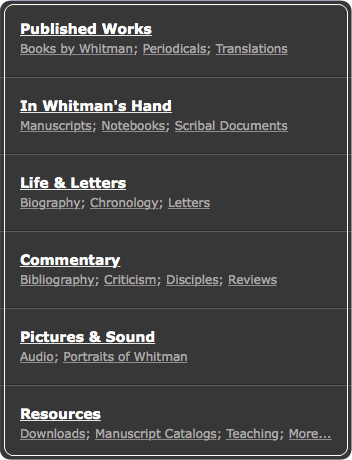
The sheer amount of Whitman-related material that the Archive makes accessible can be overwhelming, especially to new users. Below are descriptions of some of the Archive's most-popular sections, including examples of what you might find there. Along the way you can follow links to Whitman's published work, material written in Whitman's hand (including poetry manuscripts and newly discovered scribal documents), biography and correspondence in our Life and Letters section, pictures and sound, and commentary (including contemporary reviews and recent scholarship).
U.S. Editions of Leaves of Grass
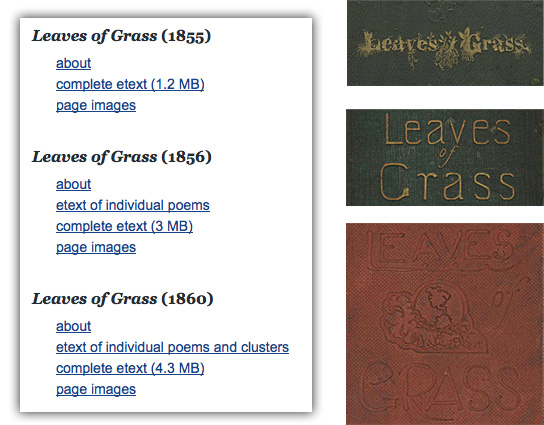
All six U.S. editions of Leaves of Grass as well as the "deathbed" edition of 1891–92 are accessible through the Archive.The Archive has transcribed a copy of each edition accompanied by high-quality, color page images of the original document.
Taking a Closer Look:
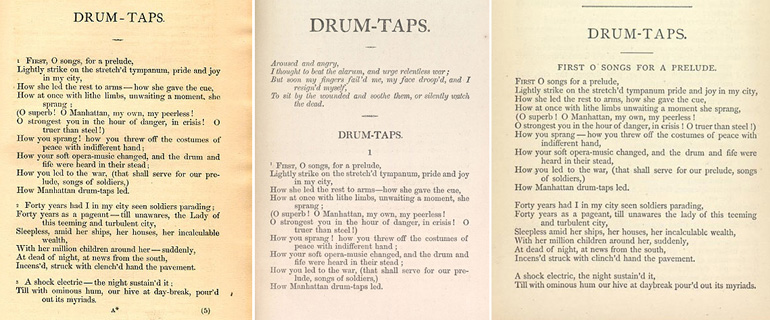
The distinct editions of Leaves of Grass offer unique research possibilities. If, for example, you were interested in reading Whitman's collection of Civil War poems, Drum-Taps, you might examine the poems as they appeared bound into some copies of the 1867 Leaves of Grass. Looking over the 1871–72 Leaves, you can see the first appearance of "Drum-Taps" as a cluster included within Whitman's larger work. The 1881–82 edition gives you a chance to consider Whitman's final placement of "Drum-Taps" within Leaves of Grass.
Other Books by Whitman
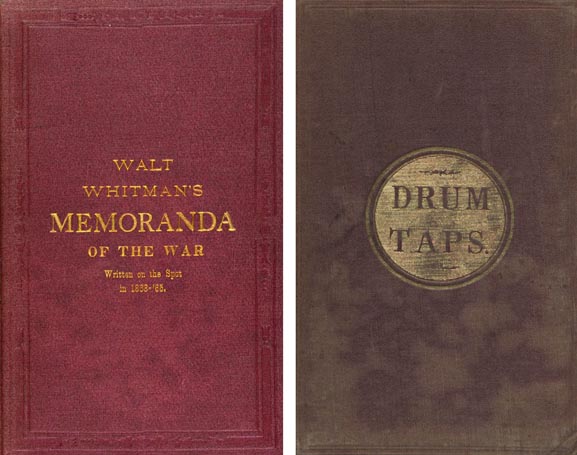
Although best known for Leaves of Grass, Whitman published many books. Eventually, this section of the Archive will include page images, transcriptions, and contextual information for all of the various prose, poetry, and mixed-genre volumes Whitman published in addition to Leaves. For now, we make available Drum-Taps (1865), Drum-Taps and Sequel to Drum-Taps (1865-66), Memoranda During the War (1876), and Complete Prose Works (1892). William Michael Rossetti's and Ernest Rhys's British editions and Elizabeth Porter Gould's edition are also included here because of Whitman's role in their creation.
Taking a Closer Look:
Those interested in Whitman's literary work during the Civil War will find both his prose recollections of the period and his war-themed verse compelling. This section of the Archive continues to grow, but Whitman's writing on the Civil War is already well-represented. Readers investigating Drum-Taps (1865), may contextualize a poem like "The Dresser" (eventually titled "The Wound-Dresser") by reading Whitman's Memoranda which details his time in Washington's Civil War hospitals or by examining the Specimen Days section of Complete Prose Works where Whitman famously declares "the real war will never get in the books."
Translations
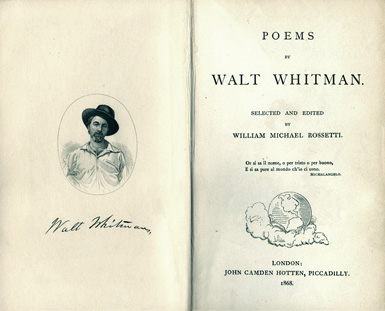
In addition to U.S. editions of Leaves of Grass, the Archive also includes book-length translations of Whitman's work into Spanish, Russian, German, and Portuguese. The Archive's collection of translations continues to expand; it now includes an extensive translation history of "Poets to Come" into French, German, Italian, Polish, and Spanish, complete with original introductions by leading international Whitman scholars.
Taking a Closer Look:
If your initial interest in Drum-Taps led you through the 1867, 1871–72, and 1881–82 U.S. editions of Leaves of Grass, you may also be curious how Whitman's poetic response to the American Civil War was presented abroad. This section of the Archive would enable you to compare Rossetti's inclusion of certain Drum-Taps poems within his Poems by Walt Whitman alongside Rhys's Leaves of Grass: The Poems of Walt Whitman, published eighteen years later.
Whitman's Work in Periodicals

Whitman published approximately 160 poems in 45 different newspapers, magazines, and journals from the late 1830s until his death in 1892. This section of the Archive brings together an important collection of first printings of Whitman's poems that have never before been systematically gathered, edited, and studied. Whitman's extensive involvement in periodical publishing helped shape his career; here visitors can see Whitman's poems as they appeared in their original print contexts.
Also now available is a selection of prose journalism, including pieces that Whitman contributed to various newspapers during the Civil War. This growing section of the Archive marks the first time these pieces have been gathered and presented together and the first time that some of the pieces have been reprinted since their initial publication.
Taking a Closer Look:
Whitman's poetry appeared in several periodicals during the Civil War. In September of 1861 Whitman first published "Beat! Beat! Drums!" in Harper's Weekly. "O Captain! My Captain!," one of Whitman's famous elegies to Abraham Lincoln, first appeared in the New-York Saturday Press in 1865.
In Whitman's Hand

This section of the Archive contains poetry and prose manuscripts, notebooks, and nearly 3,000 scribal documents written in Whitman's hand. The Archive also provides an integrated catalog of Whitman's literary manuscripts, which describes all of Whitman's poetry manuscripts and many of his prose manuscripts, noting their relationships to his published works and providing repository location information.
Taking a Closer Look:
Whitman's manuscripts offer the opportunity to study the poet's work in the germinal stages of composition. Some of the manuscripts (for example, "Beat! Beat! Drums!" and "O Captain! My Captain!") have been transcribed by the Archive and are available here. Still more manuscripts await transcription (such as notes on and drafts of "I Sing the Body Electric" and a late version of "Ethiopia Saluting the Colors"); however, high-quality images of most of these documents can already be found using the Integrated Catalog, which lists manuscripts alphabetically by title.
Life and Letters

Between 1860 and 1876, Walt Whitman wrote and received more than 1,800 items of personal correspondence. Taken collectively, they span one of the most important periods of Whitman's life, the beginning of the Civil War to the end of Reconstruction. Here, for the first time, all of Whitman's letters from this period are published. Both sides of Whitman's correspondence (outgoing and incoming) are presented together. Previously unpublished letters are presented with scans of the original documents; scans of all manuscripts will be added over time. Work to provide explanatory annotations is ongoing. Our work to publish the correspondence from the earlier and later periods of Whitman's life also continues, and thousands of letters from those years have been or will soon be added.
Taking a Closer Look:
Visitors curious about the publication history of Drum-Taps may be interested in reading Whitman's correspondence with the printer Peter Eckler who stereotyped 500 copies of Whitman's Civil War verse. Of course, Whitman's daily business as a literary professional is just one aspect of the poet's life you can explore. You can also find, for example, letters to and from Whitman's mother, his brothers, injured soldiers, and close friends.
Contemporary Reviews
The Archive's collection of contemporary reviews is the most complete record of Whitman's reception to be found anywhere. The reviews written during Whitman's lifetime, frequently within weeks or months of the appearance of his various publications, provide an important lens through which to view public perception of his work. The response to Whitman was lively, colorful, and at times wildly extreme. These extraordinary reviews are one index to the power of the writings that prompted them. The Archive has collected contemporary reviews of over twenty volumes written by Whitman, including all six editions of Leaves of Grass, Drum-Taps, Good-Bye My Fancy, Specimen Days and Collect, and Two Rivulets.
Taking a Closer Look:
Visitors interested in the reception of Drum-Taps can read reactions to Whitman's Civil War poetry from periodicals like the New York Times, the North American Review, and the Nation. Whitman's friend John Burroughs insisted that the "sadness and solemnity" of Drum-Taps stood in stark contrast to the "flushed, exultant, arrogant, fore-noon spirit" of Leaves of Grass, but William Dean Howells was less forgiving, insisting that both volumes were plagued by the same "artistic method." Perhaps the San Francisco Bulletin was most critical. Though the Bulletin found Drum-Taps to lack the "obscenity of its predecessor," Leaves of Grass, Whitman's Civil War verse was still deemed "equally destitute of merit."
Selected Criticism
This section of the Archive offers a sampling of current and historical commentary. In addition to several essays reprinted with permission, we feature more than 20 full-length books and 173 entries from The Walt Whitman Encyclopedia.
Taking a Closer Look:
Visitors looking for secondary critical work on Drum-Taps or information on Whitman's other Civil War writings will find many helpful sources here. Perhaps the Walt Whitman Encyclopedia's entries on Drum-Taps and Memoranda During the War are good places to start for those unfamiliar with Whitman's work. You might also investigate the section "Drum-Taps (1865) and Sequel to Drum-Taps (1865–66)" in Whitman Making Books / Books Making Whitman, where Ed Folsom claims that the "Civil War changed everything, including Whitman's publishing plans." In "Blood-Stained Memoranda," chapter 5 of Re-Scripting Walt Whitman, Ed Folsom and Kenneth M. Price discuss Whitman's unpublished notebooks as "some of the most astonishing Civil War documents extant."
Disciples
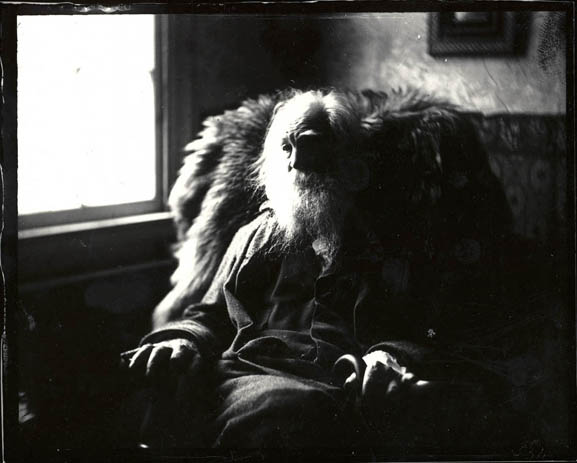
During the latter part of his life Whitman was surrounded by a circle of faithful devotees. The early Whitman biographer Bliss Perry called these individuals the "hot little prophets," underlining their sometimes over-zealous commitment to Whitman and his literary projects. The Archive uses the term "disciples" to note both the extraordinary support they gave Whitman and the religious significance they saw in his writings. This section of the Archive currently focuses on the four individuals who were most extensively involved in aiding Whitman's career and shaping his reputation: Richard Maurice Bucke, John Burroughs, William Douglas O'Connor, and Horace Traubel. At a later date, other figures (such as William Sloane Kennedy and Anne Gilchrist) may be included.
Taking a Closer Look:
One of the most valuable resources in this section is Horace Traubel's nine-volume work, With Walt Whitman in Camden. As the poet's friend and amanuensis, Traubel kept records of his daily conversations with Whitman from 1888 to 1892. The resulting volumes are a treasure trove of Whitman's opinions on all things both trivial and important. Scanning through With Walt Whitman in Camden, readers interested in Whitman's recollections of his life and work during the Civil War will encounter a mixture of the banal and the profound. You will find Whitman scrutinizing John Burroughs's review of Drum-Taps, criticizing his friend for lengthy quotations: "Quoting is a thing that gets to be a disease." But you will also find Whitman making a surprising comparison between himself and Ulysses S. Grant: "I do not value literature as a profession. I feel about literature what Grant did about war. He hated war. I hate literature. I am not a literary West Pointer: I do not love a literary man as a literary man."
Bibliography
This searchable bibliography contains articles, books, chapters of books, and poems about Whitman, published from 1838 to the present. There are over 14,000 entries in the database, most of which are annotated.
Taking a Closer Look:
Among the thousands of items compiled in this bibliography are full text copies of every article published in theWalt Whitman Quarterly Review (with the exception of the current year). A search for the keyword "Drum-Taps" and the publisher "Walt Whitman Quarterly Review" produces a list of results with links to full-text articles by M. Wynn Thomas, Ted Genoways, Adam Bradford, and Cristanne Miller, among others.
